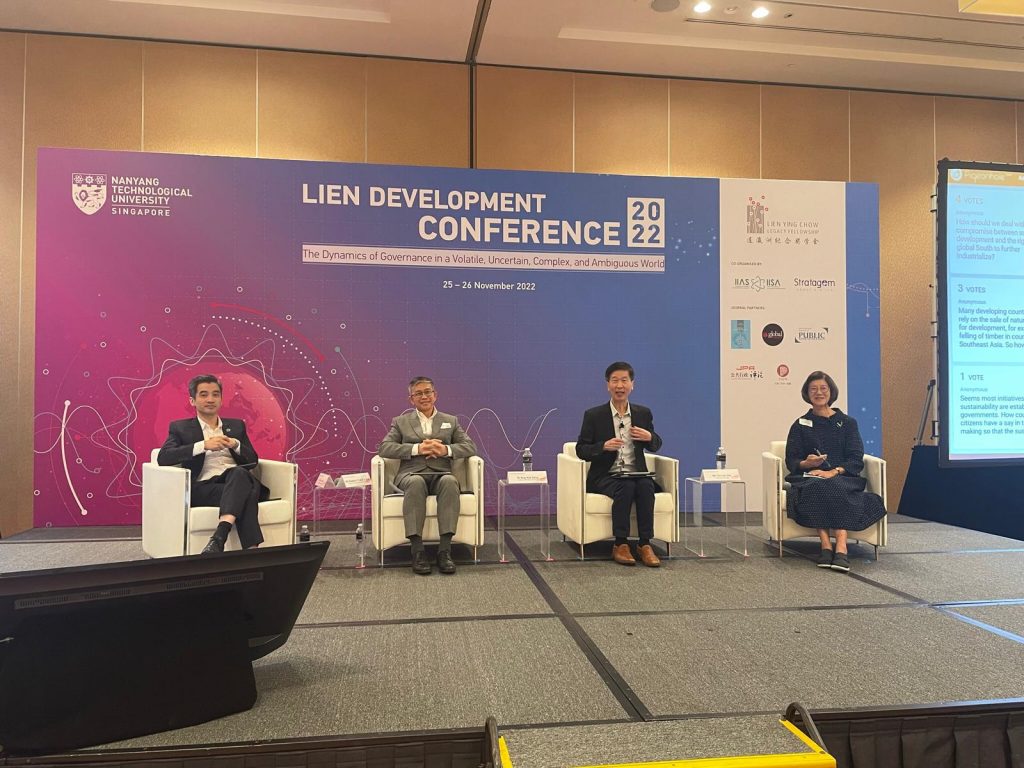[Featured Photo: The Sino-Singapore Dialogue Speakers. From right: Ms Yeo Lian Sim (panelist), Vice Chair of the Taskforce on Climate-Related Financial Disclosures (TCFD), Special Advisor on Diversity, Singapore Exchange (SGX), Singapore; Professor Ang Hak Seng (moderator), Director for the Centre of Excellence for Social Good at the Singapore University of Social Sciences (SUSS), Adjunct Professor with Nanyang Centre for Public Administration, NTU; Major General (Ret’d) Restituto F. Padilla Jr (Panelist), Executive Director for Corporate Public Policy, Risks and Sustainability, PTC, the Philippines; and Dr Chu Tien Dat (panelist), Vice Director of International Cooperation Department, Vietnam Cooperative Alliance, Vietnam.]
Sustainable Development of China and ASEAN in a VUCA World
The 12th Stratagem Group – Nanyang Technological University (NTU) Sino-Singapore Dialogue was held on 25 November 2022, in conjunction with the 30th Anniversary of Nanyang Centre for Public Administration (NCPA) and the 15th Anniversary of Lien Ying Chow Legacy Fellowship’s (LYCLF). The Sino-Singapore Dialogue was themed “Sustainable Development of China and ASEAN in a VUCA World” and involved international speakers from the Philippines, Vietnam and Singapore. In addition to the more than 70 guests attending the event at the conference venue at Marine Bay Sand in Singapore, some 200 guests across multiple industries and countries from the region registered for on-line participation.
Professor Ang Hak Seng, Director for the Centre of Excellence for Social Good at the Singapore University of Social Sciences (SUSS), Adjunct Professor with Nanyang Centre for Public Administration, NTU, moderated the dialogue and provided the background and context. Professor Ang said that as the world transitions into post-COVID, it is facing increasing uncertainty and complexity with a wide range of issues, such as Sino-US tensions, Russia-Ukraine war, heightened protectionism, climate change, energy security, inflation and food security. Governments and businesses alike are forced to learn how to navigate an international environment that is volatile, uncertain, complex and ambiguous (VUCA) in order to maintain their competitiveness and relevance. Global interconnectedness in today’s world means that ASEAN will inevitably be affected by these global events, and leaders in the region must constantly adapt to ensure their countries and people are not adversely impacted. This Sino-Singapore Dialogue provided opportunities for government officials, international affairs practitioners, academics, and businessmen to share their thoughts on how countries could strengthen their policies and institutional structures for sustainable development in both ASEAN and China.
Ms Yeo Lian Sim, Vice Chair of the Taskforce on Climate-Related Financial Disclosures (TCFD), Special Advisor on Diversity, Singapore Exchange (SGX) shared her thoughts that private companies are increasingly forced to account for ESG issues in their business operations to ensure sustainability of their businesses. However, it is critical for governments and regulators to play a more active role to enforce uniform adherence by businesses across the different industries and regions. Regulations would be necessary to incentivise private businesses to implement sustainable solutions; otherwise, it will be inevitable that some companies will choose to prioritise their financial performance above sustainability. Ms Yeo shared her hopes that regional regulators can foster closer partnerships to improve the co-ordination and efficacy of their regulatory policies.
Major General (Ret’d) Restituto F. Padilla Jr, Executive Director for Corporate Public Policy, Risks and Sustainability, PTC, the Philippines, highlighted that businesses have shifted from a Just-In-Time model to one that is Just-In-Case, amidst the trend of supply-chain decoupling. This reflects companies’ cognisance of the increasing complexity of operating in different parts of the world. Companies are now forced to prioritise stability and predictability over lean and efficient operations. This would involve companies factoring sustainable development as a primary consideration in their decision-making process, as there would be increasing regulatory and societal risks to their businesses and investments.
Dr Chu Tien Dat, Vice Director of International Cooperation Department, Vietnam Cooperative Alliance, pointed out that it is important for business stakeholders to guard against the trend of greenwashing. Transparent regulations, consistent enforcement and clear metrics are needed to accurately assess and measure sustainability performance. At the same time, there must be sufficient monetary and reputational costs imposed on ESG perpetrators to serve as deterrence. Dr Dat also shared that developed countries, which are more advanced in ESG practices and technologies, have a role to play in partnering developing nations to collectively tackle issues such as climate change. In this regard, carbon taxation would be key to ensuring that policies are equitable to both developed and developing countries such that developing nations would be unfairly penalised for their current state of ESG development.
At the dialogue, the moderator and panelists unanimously concluded that companies, regulators and citizens alike have a part to play to ensure sustainable development in the region. The challenges of today – such as climate change, geopolitical tensions, aging populations, and the fourth industrial revolution – are common and global in nature and this calls for even tighter cooperation and coordination across the various countries and regions. The panel shared their optimism that, going forward, regional countries will be able to adopt a collaborative approach to overcoming sustainability issues faced by the region.

